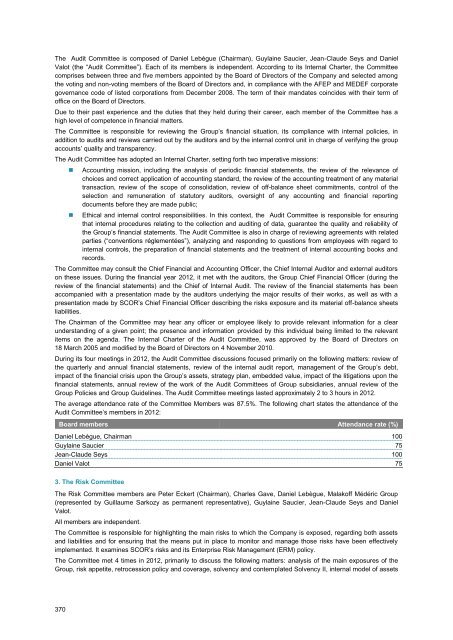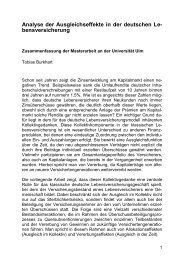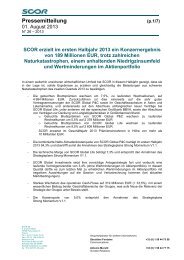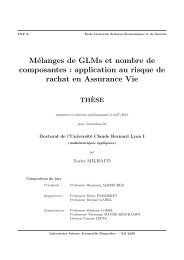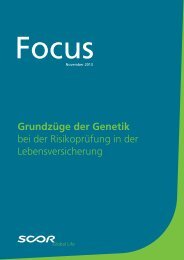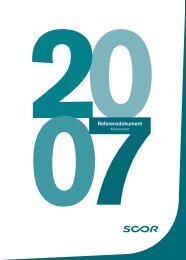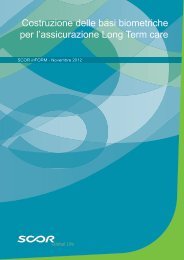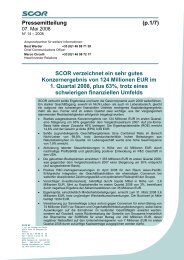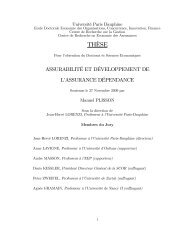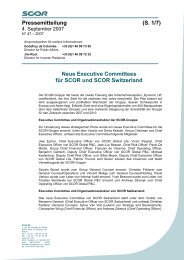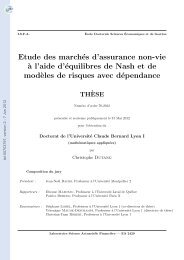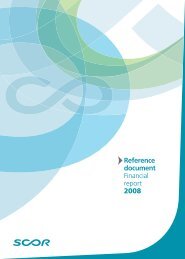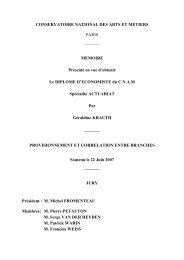4.4 Legal risk - Scor
4.4 Legal risk - Scor
4.4 Legal risk - Scor
You also want an ePaper? Increase the reach of your titles
YUMPU automatically turns print PDFs into web optimized ePapers that Google loves.
The Audit Committee is composed of Daniel Lebègue (Chairman), Guylaine Saucier, Jean-Claude Seys and Daniel<br />
Valot (the “Audit Committee”). Each of its members is independent. According to its Internal Charter, the Committee<br />
comprises between three and five members appointed by the Board of Directors of the Company and selected among<br />
the voting and non-voting members of the Board of Directors and, in compliance with the AFEP and MEDEF corporate<br />
governance code of listed corporations from December 2008. The term of their mandates coincides with their term of<br />
office on the Board of Directors.<br />
Due to their past experience and the duties that they held during their career, each member of the Committee has a<br />
high level of competence in financial matters.<br />
The Committee is responsible for reviewing the Group’s financial situation, its compliance with internal policies, in<br />
addition to audits and reviews carried out by the auditors and by the internal control unit in charge of verifying the group<br />
accounts’ quality and transparency.<br />
The Audit Committee has adopted an Internal Charter, setting forth two imperative missions:<br />
• Accounting mission, including the analysis of periodic financial statements, the review of the relevance of<br />
choices and correct application of accounting standard, the review of the accounting treatment of any material<br />
transaction, review of the scope of consolidation, review of off-balance sheet commitments, control of the<br />
selection and remuneration of statutory auditors, oversight of any accounting and financial reporting<br />
documents before they are made public;<br />
• Ethical and internal control responsibilities. In this context, the Audit Committee is responsible for ensuring<br />
that internal procedures relating to the collection and auditing of data, guarantee the quality and reliability of<br />
the Group’s financial statements. The Audit Committee is also in charge of reviewing agreements with related<br />
parties (“conventions réglementées”), analyzing and responding to questions from employees with regard to<br />
internal controls, the preparation of financial statements and the treatment of internal accounting books and<br />
records.<br />
The Committee may consult the Chief Financial and Accounting Officer, the Chief Internal Auditor and external auditors<br />
on these issues. During the financial year 2012, it met with the auditors, the Group Chief Financial Officer (during the<br />
review of the financial statements) and the Chief of Internal Audit. The review of the financial statements has been<br />
accompanied with a presentation made by the auditors underlying the major results of their works, as well as with a<br />
presentation made by SCOR’s Chief Financial Officer describing the <strong>risk</strong>s exposure and its material off-balance sheets<br />
liabilities.<br />
The Chairman of the Committee may hear any officer or employee likely to provide relevant information for a clear<br />
understanding of a given point; the presence and information provided by this individual being limited to the relevant<br />
items on the agenda. The Internal Charter of the Audit Committee, was approved by the Board of Directors on<br />
18 March 2005 and modified by the Board of Directors on 4 November 2010.<br />
During its four meetings in 2012, the Audit Committee discussions focused primarily on the following matters: review of<br />
the quarterly and annual financial statements, review of the internal audit report, management of the Group’s debt,<br />
impact of the financial crisis upon the Group’s assets, strategy plan, embedded value, impact of the litigations upon the<br />
financial statements, annual review of the work of the Audit Committees of Group subsidiaries, annual review of the<br />
Group Policies and Group Guidelines. The Audit Committee meetings lasted approximately 2 to 3 hours in 2012.<br />
The average attendance rate of the Committee Members was 87.5%. The following chart states the attendance of the<br />
Audit Committee’s members in 2012:<br />
Board members Attendance rate (%)<br />
Daniel Lebègue, Chairman 100<br />
Guylaine Saucier 75<br />
Jean-Claude Seys 100<br />
Daniel Valot 75<br />
3. The Risk Committee<br />
The Risk Committee members are Peter Eckert (Chairman), Charles Gave, Daniel Lebègue, Malakoff Médéric Group<br />
(represented by Guillaume Sarkozy as permanent representative), Guylaine Saucier, Jean-Claude Seys and Daniel<br />
Valot.<br />
All members are independent.<br />
The Committee is responsible for highlighting the main <strong>risk</strong>s to which the Company is exposed, regarding both assets<br />
and liabilities and for ensuring that the means put in place to monitor and manage those <strong>risk</strong>s have been effectively<br />
implemented. It examines SCOR’s <strong>risk</strong>s and its Enterprise Risk Management (ERM) policy.<br />
The Committee met 4 times in 2012, primarily to discuss the following matters: analysis of the main exposures of the<br />
Group, <strong>risk</strong> appetite, retrocession policy and coverage, solvency and contemplated Solvency II, internal model of assets<br />
370


